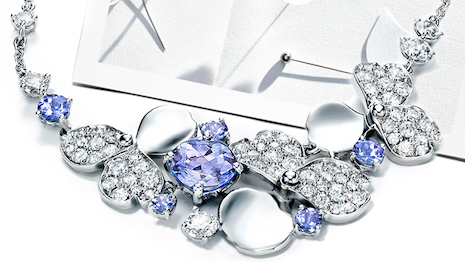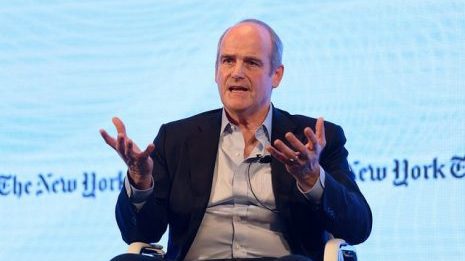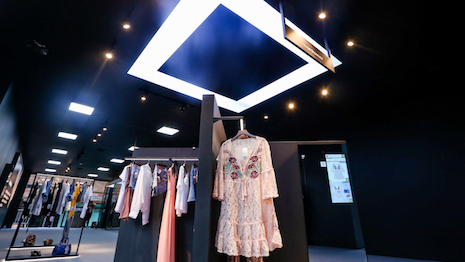 Alibaba's Luxury Pavillion has been a driver of growth. Image credit: Alibaba
Alibaba's Luxury Pavillion has been a driver of growth. Image credit: Alibaba
HONG KONG – On the heels of another record-breaking Singles' Day, an Alibaba executive made it clear that the Chinese ecommerce giant has even bigger goals in mind.
Alibaba has proven to be extremely popular among Chinese millennials and buyers of pricey goods, especially after the launch of its Luxury Pavilion vertical. During a conversation with David Gelles at The New York Times International Luxury Conference on Nov. 12, the president of Alibaba Group reiterated that the company plans to continue making its presence known beyond online shopping.
“Part of the reason we invest so much into Singles' Day, a day where we delivered 1 billion packages in 24 hours, is because we believe a time will come when we operate at that scale every single day” said Michael Evans, president of Alibaba Group.
Luxury sales
Alibaba hit more than $30.8 billion in sales this Singles' Day, surpassing the 2017 record of $25.3 billion. Reportedly, sales reached $1 billion in less than 90 seconds.
Now in its tenth year, Singles’ Day has established itself as the largest global shopping holiday of the year, with sales eclipsing Black Friday.
Celebrated every year on Nov. 11, retail giant Alibaba turned Singles’ Day from a holiday for unmarried individuals into a discount-driven ecommerce extravaganza in 2009. In more recent years, Singles’ Day has evolved into a more global, omnichannel affair, opening up opportunities for luxury brands to cater to consumers beyond China (see story).
The Tiffany Paper Flowers collection premiered on Luxury Pavilion. Image credit: Alibaba
Beyond Singles Days' Alibaba's Tmall has also been working more closely with high-end labels through its Luxury Pavilion.
Italian fashion label Moschino is the latest company looking to grow its presence among Chinese millennials by launching a shop on Alibaba's Tmall Luxury Pavilion.
At launch, Moschino’s flagship will carry a collection exclusively designed for Tmall customers. The brand is joining a number of other luxury labels on the platform, including Burberry and Maserati, who are looking to tap into China’s growth potential.
About half of the shoppers on Alibaba’s ecommerce platforms were born after 1990. This age group accounts for 45 percent of all luxury sales across Alibaba’s retailers (see story).
Michael Evans, president of Alibaba Group. Image credit: C.K. Man for The New York Times
Despite these relationships with luxury brands, Alibaba has been criticized for failing to appropriately handle counterfeit products on its sites.
Last year, Alibaba introduced a new plan for its Intellectual Property Protection Platform (IPP) and routine checks to make sure brands are satisfied with its measures.
The bulk of the new platform is devoted to responding to complaints about fakes quicker and more efficiently, bringing in a new team dedicated solely to the task and creating a single portal through which all products must go to ensure authenticity (see story).
"We protect consumers and brands, but also our own brand protection," Mr. Evans said. "If we can’t lead in brand protection, we will not lead in ecommerce."
Future plans
The ecommerce leader has also searched for new ways to innovate physical shopping experiences.
This summer, Alibaba opened a concept store that offered shoppers and luxury retailers a look at a new frontier for fashion retail digitization.
Dubbed “FashionAI,” the pilot boutique harnessed artificial intelligence capabilities for a stress-free shopping experience. While it was only open for a few days, the store acted as a temporary testing ground for innovative retail formats.
Each item had an “intelligent lock” that is supported by radio-frequency identification, gyro-sensors and Bluetooth low-energy chips. The intelligent locks communicate with the smart mirrors to show product information for each garment, as well as offer other clothing recommendations (see story).
Alibaba opened up an artificial intelligence-enabled concept store. Image Credit: Alibaba
"Our focus is the total market for commerce, not just online," Mr. Evans said. "We need presence in malls and to enable with technology that enhances consumer experience even in an offline setting."
Mr. Evans also discussed his thoughts on trade between China and the United States.
An upcoming meeting between Chinese president Xi Jinping and U.S. president Donald Trump on Dec. 1 has the potential to progress negotiations, but it is not clear whether this will have the ability to curb further escalations. The two leaders have had multiple rounds of discussions without coming to an agreement.
At the moment, the tariffs being placed on Chinese goods entering the U.S. is 10 percent, but that could climb to 25 percent next year (see story).
"There are no winners in a trade battle – or any other battle – between China and the U.S.," Alibaba's Mr. Evans said.



